Albert Baldwin Bantock
Thomas's second son, Albert Baldwin Bantock, born in
1862, had two brothers and seven sisters.
|
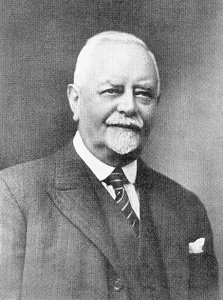
A. Baldwin Bantock. |
Educated at Tettenhall College he became a partner
in his father's business in 1886. His eldest brother appears to have
been sent to South Africa in disgrace, while the other married a
rich heiress of the Birmingham Barber family and showed no interest
in the family firm. A. B. Baldwin was also a member of Queen Street
Congregational church.
Like his father he had political inclinations
and became the representative of St James' Ward in 1900. He was
elected Mayor in 1905 and re-elected in 1906. He too held Mayor's
Sunday at Queen Street Chapel but without the fuss his father had
suffered. However the Wolverhampton Journal for December 1906 says:-
"The service not taking place at the Old Church, the Yeomanry and
Volunteers took no part in the procession". Bantock would therefore
have been denied the benefit of a band at the front of his
procession! |
| The Tory owned local paper seems to have held a
scarcely concealed dislike for Liberal councillors. This journal, on
11th November 1905, three days after Bantock's election commented:
"'To be a Mayor you have to have £1000 after calling in all debts
you owe. That is a very wise precaution for it ensures the
Corporation against the risk of a Mayor absconding with the Red
Robe-Gold Chain-Mace or any other thing he might find lying handy.
Of course a poor man can't become Mayor, and that is only right
since the poor have enough to put up with as it is …".
Albert Baldwin Bantock had inherited the business and Merridale
House when his father died in July 1895. He had the house
considerably changed on the outside and internally brought up to
date with fine panelling in the Arts and Crafts style.
|
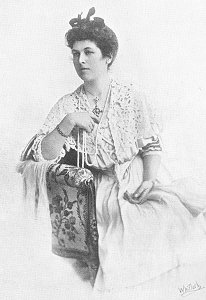
Mrs. A. B. Baldwin.
|
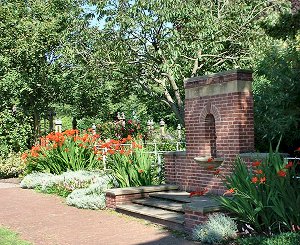
The memorial to A. B. Bantock in the gardens
of Bantock House. |
The old office was removed and replaced with a
grand staircase and rear vestibule, also the double bay window
looking out on the gardens was erected.
The garden was redesigned to reflect current taste. A B
Bantock was a keen gardener, winning many prizes. Not too hard
with two full time gardeners, perhaps! His liking for the
"baronial" style led to changes in the house; the panelling, the
ceilings and the friezes downstairs (except for the front hall)
all date from his time; so does the five-sided window in the
drawing room and the front bedroom.
|
We know more of his domestic arrangements than of any
earlier inhabitant. He was looked after indoors by a cook, chamber maid,
in between maid and sometimes another maid; he had a chauffeur and two
gardeners. His gamekeepers looked after his shoot in Coven, where he
shot twice a week, accompanied by his black Labrador "Sailor" (Mrs
Bantock had two Pug dogs). We know that suet pudding was always served
on Saturday, by request, and the household linen was laundered in
Scotland!
|
At the outbreak of war in 1914, the newspapers were full
of war news. In November of that year A B Bantock was once more elected
as Mayor. This distinction of being three times Mayor of the town is
unique to A B Bantock and shows the regard in which he was held by his
fellow members of the Council.
Since it was war time it was most appropriate for the
procession, again to Queen Street, to be led by the military.
Consequently the Band of the 6th Battalion of the South Staffords
together with a detachment of the Royal Army Medical Corps and a large
contingent of National Reservists were engaged for the event. However
Bantock had his own ideas!
At 9.22 on the Sunday morning a train drew up at the High Level
(LMS) station and a hundred and twenty men and officers of the
6th Battalion of the Seaforth Highlanders, in full regimental
dress with kilts, pipes and drums disembarked! |
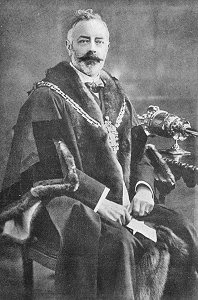
A. B. Bantock in his mayoral robes.
|
They had come, not direct from Scotland, as the rumour
had it, but from Birmingham where they had been training in musketry. It
was they and not the Staffords who led the parade. But the bandmasters
agreed to divide the music equitably between the two bands.
After the service and the dismissal of the parade, Mr
Mayor Bantock entertained the Scotsmen and their officers to lunch in
the Drill Hall. The others all had home cooking that day. Father Thomas
Bantock would have enjoyed such sweet revenge!
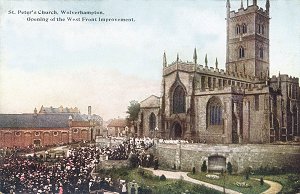
A postcard of the opening of the new west
front gardens, by the Mayor, A Baldwin Bantock. |
Alderman Bantock was a borough magistrate in
Wolverhampton and a county magistrate for Staffordshire. In 1920 he
was the High Sheriff of the county.
For years he was the Chairman of the Corporation Finance
Committee.
He worked to improve the appearance of the town, particularly
in the area in front of St. Peter's and in the re-ordering of
Queen Square. |
He was a generous supporter of local charities, both with his money and
his time.
|
A life governor of the Royal Hospital and of the Women's
Hospital, from 1892 he was on the governing board of the Eye
Infirmary and its Chairman from 1910-1936.
Through his generosity a branch library was built in Horseley
Fields.
Among his gifts to the town was a collection of old books,
prints and photographs and a set of Georgian silver for the
Mayor's use.
|
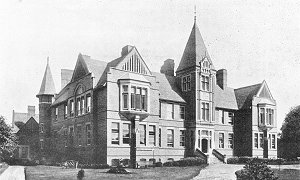
The Eye Infirmary, photographed about 1900.
|
Baldwin, like his father, was a supporter of Queen
Street Congregational Church, where he became Senior Deacon.
He worked to provide a Congregational church and school in Lea
Road and for 17 years he was the Superintendent of the Sunday
School at Lea Road Church. As for Tettenhall College, where he was governor from 1888, it
is doubtful whether it could have survived without his support.
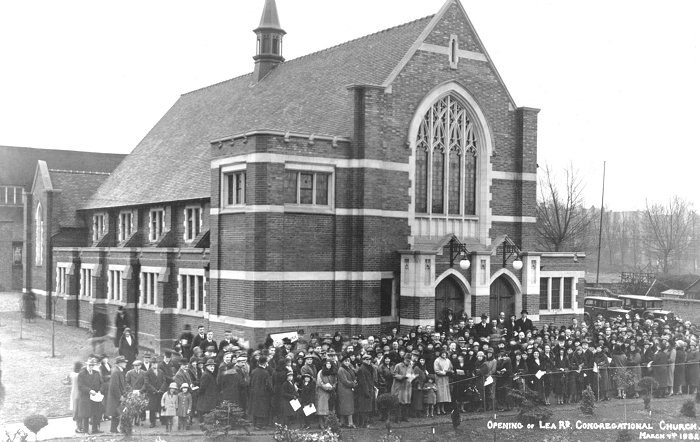
The opening of Lea Road Congregational Church, 7th
March, 1932. Courtesy of David Clare.
In November 1926, Alderman Bantock received the Freedom of
the Borough. There have only been 15 Freemen since the Borough was
incorporated in 1848, including Earl Haig and David Lloyd George.
Baldwin died in 1938 leaving the house and grounds to the
people of Wolverhampton. "There are two kinds of people in this world",
said the Chairman of Tettenhall College Governors, "those who snatch and
those who enrich; and Mr Bantock was known to us all as one of the
latter."
 |
|
 |
| Return to
Thomas Bantock |
|
Return to
the Exhibition |
|

